Hello everyone,
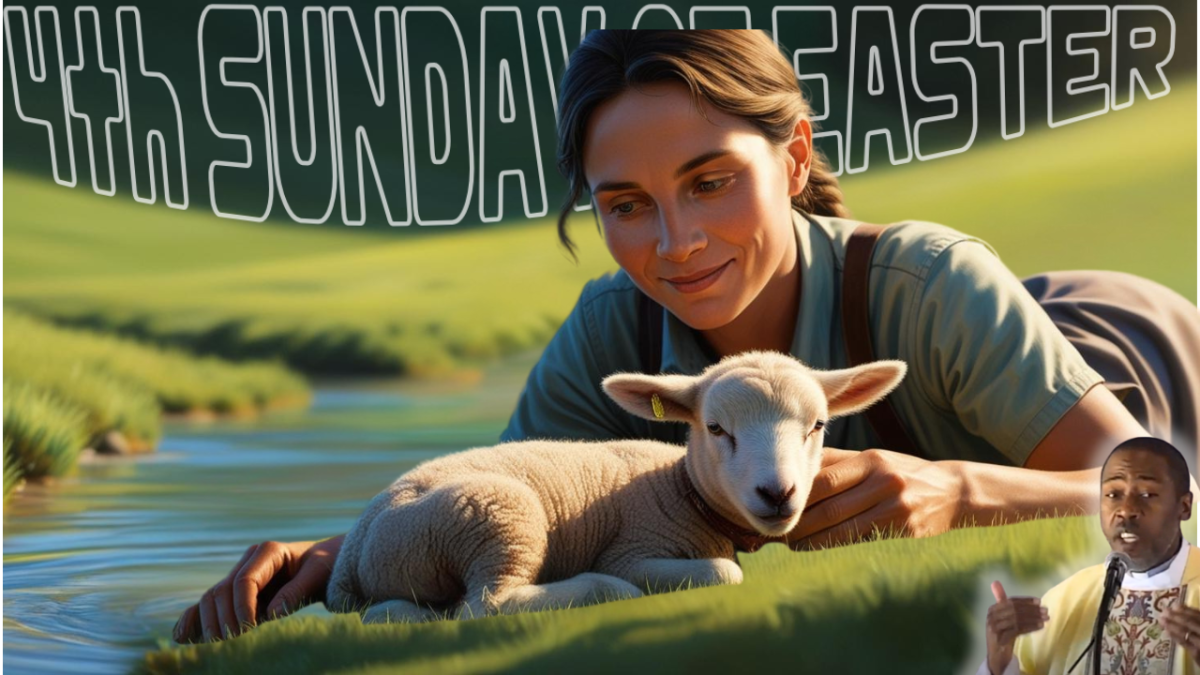 It was a special time together this past Sunday, especially as we commemorated Mother’s Day. A very happy Mother’s Day indeed to all mothers and those who have served as mother figures in the lives of others. You are most welcome.
It was a special time together this past Sunday, especially as we commemorated Mother’s Day. A very happy Mother’s Day indeed to all mothers and those who have served as mother figures in the lives of others. You are most welcome.
During our gathering, I shared a piece of advice that I’ve found incredibly helpful, particularly when engaging with those who are new to the faith or who may not yet have faith. I can’t quite recall if I read it somewhere or if a friend told me, but the advice is this: If you ever have the opportunity to share the gospel with an unbeliever or someone new to the faith, the best place to begin is with the Gospel of John.
The main reason for this recommendation is that unlike the Gospels of Matthew, Mark, or Luke, which often provide a general survey or overview of Jesus’ life, the Gospel of John is written with a very specific teaching purpose. Its goal is to help readers become rooted and grounded in their faith and to be able to grow in that faith. John doesn’t offer a strict, chronological synopsis of Jesus’ life from beginning to end. Instead, he is very clear about his objective, stating it explicitly at the end of his account:
John writes, “Now Jesus did many other signs in the presence of his disciples, which are not written in this book.” He then adds, “But these are written so that you may come to believe, or may continue to believe, that Jesus is the Messiah, the Son of God, and that through believing, you will have life in his name.”
So, John wrote his gospel with the specific intention that the eyes of the unbeliever would be opened. And, having been opened, that they might then place their faith and trust in Jesus and continue to believe in him, so they could receive the fullness and abundance of the life that he freely gives.
In setting out his gospel, John selects what I refer to as seven signs. He calls them signs, and he chooses these specific seven with the intent of pointing his readers to the truth of Jesus’ identity as the Messiah. These signs help us understand who he is as we read through the account.
By the point we were reading in the Gospel of John, John has already described six of these seven signs. He has held up for us:
- The wedding feast in Cana of Galilee, where Jesus turned water into wine – the best wine they had ever had.
- Jesus’ healing of the royal official’s son from a distance, with the simple assurance of his word, “Go, your son will live”.
- The healing of the paralytic at the pool of Bethesda, who had been lying there for 38 long years. Jesus simply asked him if he wanted to be made well.
- The miraculous feeding of five thousand people with just five barley loaves and two fish. This reminded the people of God providing for the multitude in the wilderness with manna.
- Jesus walking on the water, coming to his disciples in the boat in the middle of the storm – the one whose voice the winds and waves still obey.
- In chapter nine, the account of Jesus opening the eyes of a man who was born blind. Jesus told him to go wash in the pool of Siloam, and when he washed and came back, he could see.
Jesus performed these deeds, signs, and many other wonders. They were for those who had eyes to see and ears to hear. These actions echoed the activity of God in Israel’s history and among them. They pointed, like signposts, to the fact that this Jesus was none other than the Messiah. We understand what a signpost is, right? If you’re going down the road, trying to reach a particular destination, especially somewhere unfamiliar, the signpost directs you. These miracles, these signs, point right to Jesus, saying, “If you want to find the Messiah, this is the way.”
And so Jesus’ whole life and the works he did in his father’s name were like visible words. They were like actions which spoke, and which spoke loudly, proclaiming clearly to all who would see and all who would hear that he was, in fact, the Messiah.
But in the passage we were looking at, the Jewish leaders surrounded Jesus in the temple. They were among those who refused to see or hear the testimony provided through Jesus’ own words and his actions. They wanted Jesus to speak plainly, to say outright, that he was the Son of God. However, their intention was not that they might believe, but that they might find grounds to condemn him and therefore put him to death.
They said to Jesus, “How long will you keep us in suspense? If you are the Messiah, tell us plainly.” Jesus’ response is insightful. He says, “I have told you, and you do not believe. The works that I do in my father’s name testify to me.” He then adds, “But you do not believe because you do not belong to my sheep.” He continues, “My sheep hear my voice; I know them, and they follow me.”
Friends, Jesus explained that his sheep hear his voice. That is, they hear God’s voice speaking to them through the words and actions of Jesus’ life. Jesus’ words and his actions – turning water into wine, healing the sick, feeding the five thousand, walking on water – these works spoke with a voice of their own, proclaiming and testifying to his identity as the Messiah. But because the religious leaders refused to humble themselves and come to him (unlike Nicodemus, who came under the cover of darkness, but still came), they could not hear the testimony. They couldn’t hear the voice speaking through his actions.
And friends, let me tell you, this still happens today. There are some who will pick up the scriptures and they’ll ask, “Okay, tell me where it says, ‘Here, Jesus said, I am God.'” Now, in a few places, you might be hard-pressed to find that exact phrasing. But my response has always been, “Tell me where it *doesn’t* say that Jesus is God!” Anyone who acts and speaks in the way that Jesus did, is *not* God? Then you have to give me a better explanation for how I might understand him. As C.S. Lewis argued, if he isn’t who he claimed, you’re left with other explanations like he was a lunatic or a liar.
But the reality is, as I sometimes see, there are none so blind as those who refuse to see. And by refusing to see, they are therefore easy to condemn because they are already hardened. And they do have a very sad place to be in this world when we put up these walls because we refuse to hear or see.
Jesus’ sheep hear his voice. That is, they hear God’s voice speaking to them through the words and indeed, the actions of Jesus’ life. And Jesus says, “I know them, and they follow me. I give them eternal life, and they will never perish; because no one will snatch them out of my hand.” What a wonderful promise to give us!
So, the first issue is seeing. This gospel story suggests to me that there are so many in this world for whom hearing God’s voice is made difficult because they refuse to see. That is, they have prematurely or indeed prejudicially rejected Jesus as God. And so they cannot hear the testimony that comes through the actions of his life. These actions will always mean something else to them; they will never point to the Messiah.
Now on another level, God’s work or his signs are not just gone cold and it didn’t happen back then right before our eyes. No, God, as he has made known to us in Jesus Christ, is as always and will always be at work in his creation, at work among his human creatures, proclaiming the truth of his presence in visible words that they can see and hear. As Romans says, his glory, who he is, has been made known so that we are all without excuse when it comes to the reality of God’s presence among us.
Within the Anglican tradition, we are situated in a space where those visible words are perhaps more readily perceived in our sacramental actions and things like Baptism, Confirmation, Holy Matrimony, and sharing the Communion in the solemnization of Holy Past the moment. But we see and hear them also from God’s activity in the prayers for the sick, the ministry of healing, and for those who are dying. God is at work. Visible words, like Jesus in his whole life, are proclaimed in those sacramental moments.
And so before we give way to the temptation to criticize the religious leaders of Jesus’ day in a negative way, I believe we always ought to ask ourselves first whether we have responded or are responding appropriately.
Are you hearing his voice speaking to you through the visible words of God’s activity among us? Are you following him as he leads? This means embracing the means God has provided for us to nourish us, to sustain us along this journey of faith. You know, sometimes we separate ourselves from these means, these visible words, and then we say, “Well, we don’t see them.”
So maybe we don’t gather for sacramental worship. Maybe we don’t pick up the scriptures to read. Maybe we don’t place ourselves where we can hear the word proclaimed. You can’t shut your eyes and then say, “Oh, I don’t see anything. There’s nothing else there.” It is easy to sit back and demand some clear sign and back and forth before we might decide to come and follow him and truly believe. But I think denying those kinds of signs is perhaps another way of mirroring their hardness of heart. And what God is not going to do and what God will do for us is what we will allow him to do for us.
Jesus grounds his grace in our paying attention to the visible words of God’s actions. So will you then come and continue in the promise of the Son of the Living God?
Introduction
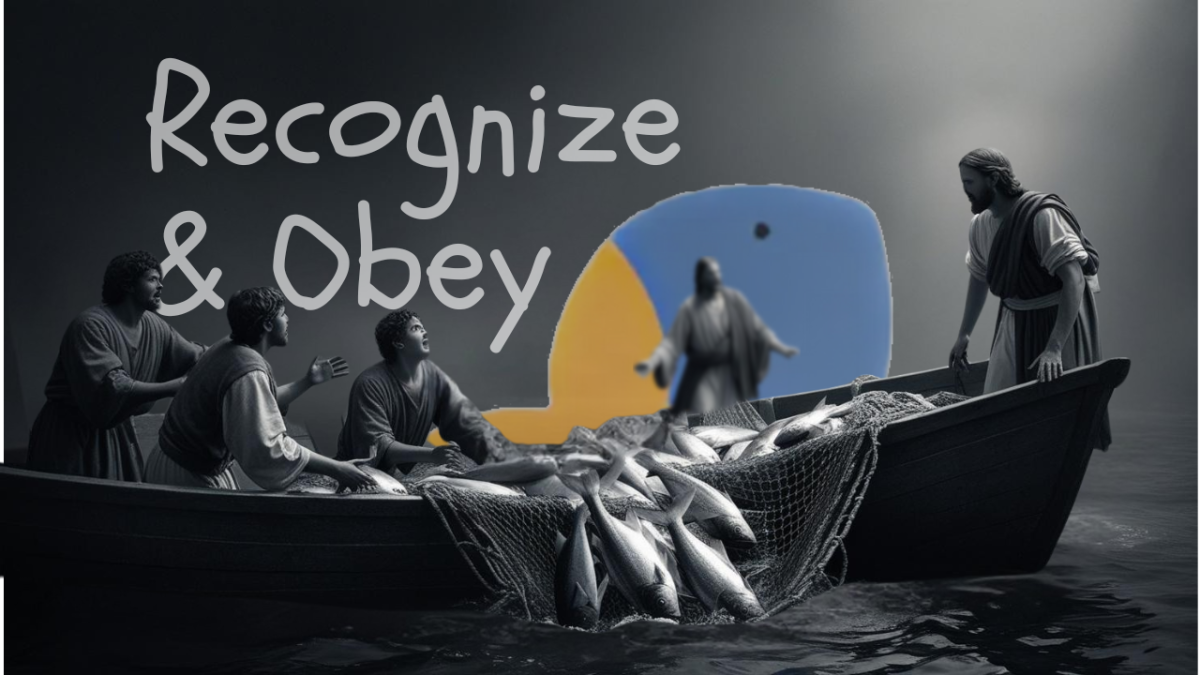 In today's reflection, I would like to explore some profound insights from John's Gospel, specifically chapter 21, verse 12. This passage offers a narrative where Jesus invites His disciples to "come and have breakfast." The disciples did not question His identity, as they already knew it was the Lord. This simple gesture of sharing breakfast holds deeper meanings about obedience, recognition, and the transformative power of faith.
In today's reflection, I would like to explore some profound insights from John's Gospel, specifically chapter 21, verse 12. This passage offers a narrative where Jesus invites His disciples to "come and have breakfast." The disciples did not question His identity, as they already knew it was the Lord. This simple gesture of sharing breakfast holds deeper meanings about obedience, recognition, and the transformative power of faith.
Reflecting on Cast the Net Initiative
Since late 2022, the Diocese of Toronto has been engaging with this passage through an initiative called "Cast the Net." This listening and visioning process has led to the formation of 20 aspirational and challenging calls, aiming to discern where God is leading us. Each congregation is encouraged to focus on two or three of these calls, specific to their community context.
Obedience and the Risen Lord
This initiative underscores our obedience to the risen Lord. It's about moving beyond our preconceived notions of how God should work. God's call often involves doing an old thing but in a new way, much like He instructed the disciples to cast their nets to the other side of the boat. The Risen Christ, whom we celebrate during Easter, is proclaimed as Lord of all creation. He continues to cross our implicit boundaries and challenges us to see His hand at work in unexpected ways.
Obedience Precedes Recognition
One of the central themes throughout scripture is the connection between obedience and recognition. The disciples' inability to initially recognize Jesus on the shore until they obeyed His command illustrates this pattern. Likewise, the story of Ananias in the Acts of the Apostles demonstrates how obedience can lead to new spiritual insight and sight.
Love and Obedience in Action
Jesus' interaction with Peter emphasizes that love for God cannot be separated from participation in His ongoing work. True love manifests in habitual obedience, even in unfavorable circumstances. Easter teaches us about recognizing God at work in our midst—not through physical sight but through spiritual understanding that comes from following Christ.
Conclusion
The written word of God becomes authoritative in our lives to the extent that the risen Word has claimed us. As we delve deeper into understanding our relationship with God, I invite you to reflect on how obedience and recognition play out in your own spiritual journey. Together, let us embrace the opportunities to see God at work, trusting and obeying His call with renewed vision and purpose. Amen.
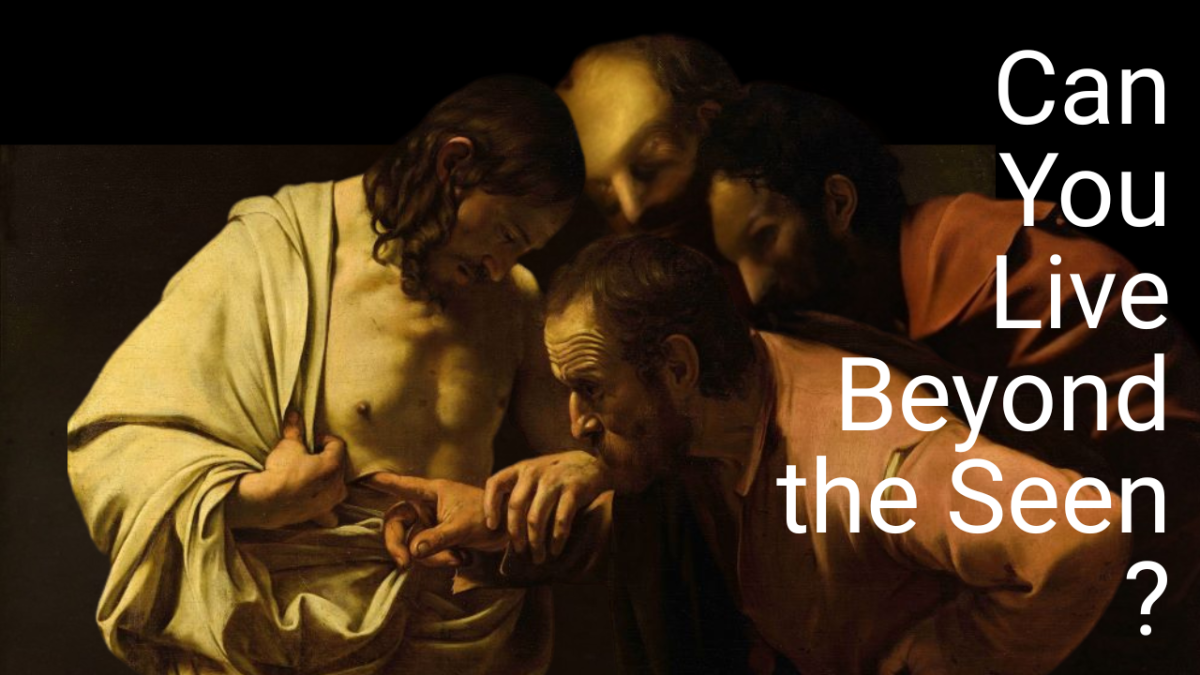 I want to share with you some profound insights from John’s Gospel, chapter 20, verse 29. Jesus said to Thomas, “Have you believed because you have seen me? Blessed are those who have not seen and yet have come to believe.” This passage opens a window into the spiritual journey from doubt to faith. Today, I invite you to explore this journey with me—a journey that challenges believers to live beyond what is immediately visible.
I want to share with you some profound insights from John’s Gospel, chapter 20, verse 29. Jesus said to Thomas, “Have you believed because you have seen me? Blessed are those who have not seen and yet have come to believe.” This passage opens a window into the spiritual journey from doubt to faith. Today, I invite you to explore this journey with me—a journey that challenges believers to live beyond what is immediately visible.
The Journey of Faith Begins
I want to begin by recounting the story of a young man whose journey in faith was ignited through a tearful conversation with a trusted Christian friend. His Christian journey, unbeknownst to him, had commenced long before this catalytic moment. Early that very day, he was moved by what he perceived to be God’s personal call: “Come and truly follow me.” That night, he found himself responding to this call on his knees. This transition from doubt to faith is one he would come to experience continuously, learning not to question whether Jesus is, indeed, Lord and God.
Thomas and His Moment of Revelation
In our Gospel reading, Thomas’s journey from doubt to faith took place over a week. Yet, like all believers, his faith was meant to grow ever more steadfast. On the evening when Christ first appeared to his disciples, Thomas was absent, doubting until he could see the evidence of Jesus’s wounds. Despite the brutality of Jesus’s death, what Thomas needed was that tangible proof, and Jesus, in His grace, provided it. Jesus met Thomas’s doubt, not out of obligation but out of mercy, to elicit faith from him.
This transformative encounter changed Thomas’s perspective forever. When Jesus appeared, not bound by locked doors, standing before him in His resurrected body, Thomas’s doubt melted into unequivocal belief, prompting his exclamation: “My Lord and my God.”
Reflecting on Our Own Journey
This journey from doubt to faith is one that speaks to many of us today. Standing with Thomas, waiting to be moved from doubt to faith, is a common position. Until we make that journey ourselves, we truly have not begun to live the resurrected life. The assurance that belief must transition from the mind to the heart is central to experiencing the life God offers abundantly.
Jesus’s words, “Blessed are those who have not seen and yet have come to believe,” carry a promise of blessing. True belief is dynamic, it involves movement and action. It’s not merely what we think but what we do with our faith that defines us.
Faith in Action
Our faith must not exist merely as a mental exercise or private belief. It is the root from which our actions stem. As James aptly puts it in his letter, faith without works is dead. True faith is demonstrated in how we live our lives daily.
This active faith points not to our capabilities, but to our confidence in God and His promises. When we recite the Apostles’ Creed, for instance, we are not merely professing words but affirming the God revealed as Father, Son, and Holy Spirit. Our confidence lies entirely in God, not ourselves.
The Call to True Belief
I urge you to contemplate whether you have embraced belief in Jesus, not just intellectually but with true conviction. The journey from doubt to faith is personal, one that requires engaging with others, absorbing wisdom, and embracing the community of believers.
Thomas teaches us to be open to the testimony of others and to receive Jesus as Lord. Through this, we receive new life and continue our journey of growing in faith and obedience.
Conclusion
Returning to the story of the young man, his faith journey marked a new chapter when the Risen Lord became real to him. It was a profound awakening to Jesus’s presence that had been with him all along. Is today the day for you to commence this journey? Or perhaps God is guiding you to share this profound journey with someone else in need.
Let us pray for guidance and strength, as we travel from doubt to faith in the light and love of the Risen Christ. Amen.
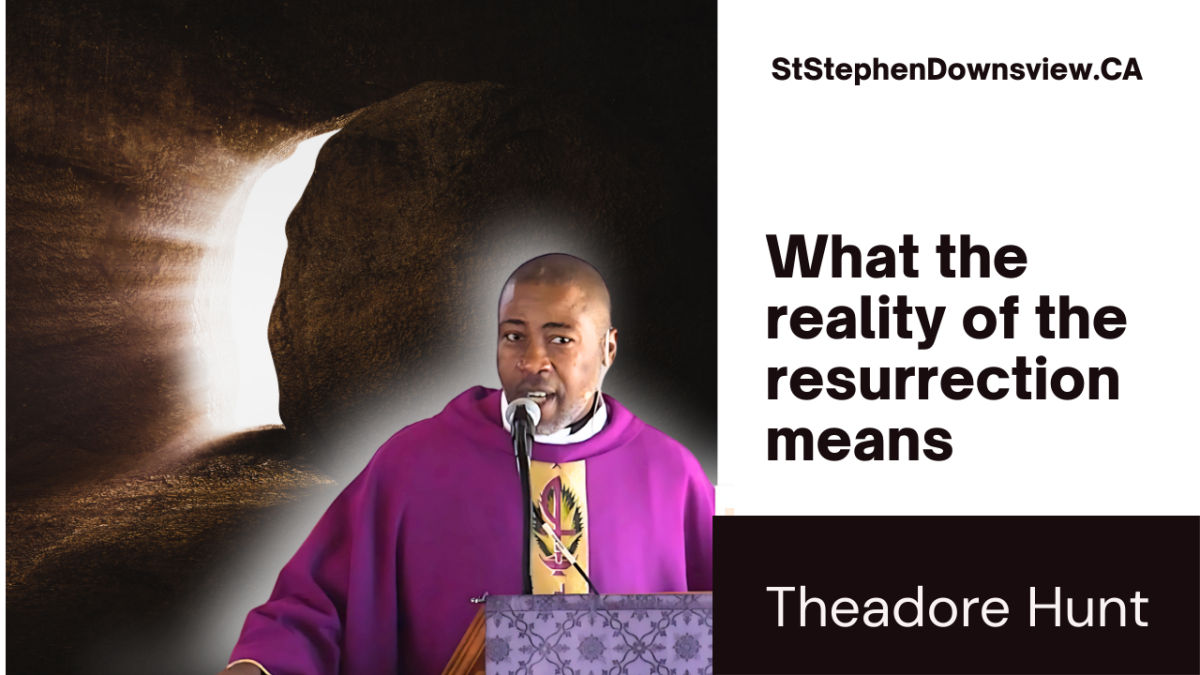 Welcome, everyone. It’s so good to see all of you as we gather on this Easter Sunday to commemorate the resurrection of our Lord. I want to share some reflections from Luke’s gospel. As you’ve heard in Luke chapter 24, verses 9 to 11, we see the account of the women discovering the empty tomb and the apostles’ initial disbelief. These stories are rich with lessons for our lives today.
Welcome, everyone. It’s so good to see all of you as we gather on this Easter Sunday to commemorate the resurrection of our Lord. I want to share some reflections from Luke’s gospel. As you’ve heard in Luke chapter 24, verses 9 to 11, we see the account of the women discovering the empty tomb and the apostles’ initial disbelief. These stories are rich with lessons for our lives today.
The Realness of the Gospel
Over the years, I’ve come to appreciate the authenticity with which the resurrection accounts are told. If you pay close attention to the text, you’ll notice there are no attempts to smooth out the rough edges. The realness is evident in the disciples’ misunderstandings and in their initial disbelief. As we reflect on these accounts, we see that they aren’t just carefully crafted tales but genuine parts of our history.
The Women at the Tomb
In today’s scripture, Luke tells us about the women who went to the tomb with spices, intending to prepare Jesus’ body. Despite hearing Jesus predict his resurrection, they expected to find his body there. Their confusion when confronted with the empty tomb is a testament to the unexpected nature of the resurrection event.
The First Proclaimers of Resurrection
An interesting aspect of this narrative is the role of the women as the first bearers of the resurrection news. In a patriarchal society, their testimonies weren’t given the same weight as those of men. Yet, Luke highlights these women: Mary Magdalene, Joanna, and Mary, the mother of James. Their experience challenges our own biases and invites us to see the extraordinary roles that seemingly ordinary people play.
Questions of Belief
The apostles were slow to believe the women’s account, which the text describes as seeming to them an “idle tale.” It prompts us to question: Are we, too, sometimes unwilling to believe truths that challenge us? Do we require the resurrection to meet our own burdens of proof before we accept its implications?
Implications of the Resurrection
What we believe about the resurrection matter. It’s not simply a message to be proclaimed but an event that changed human history. It challenges us to consider Jesus not just as a historical figure but as the living Christ who continues to impact the world today.
Conclusion
In our reflections this Easter, let us embrace the complexity and authenticity of the resurrection story. May it stir within us a deeper faith and a willingness to be transformed by its reality. As we remember that Easter morning, let us carry forward the hope and new beginnings that the resurrection signifies.
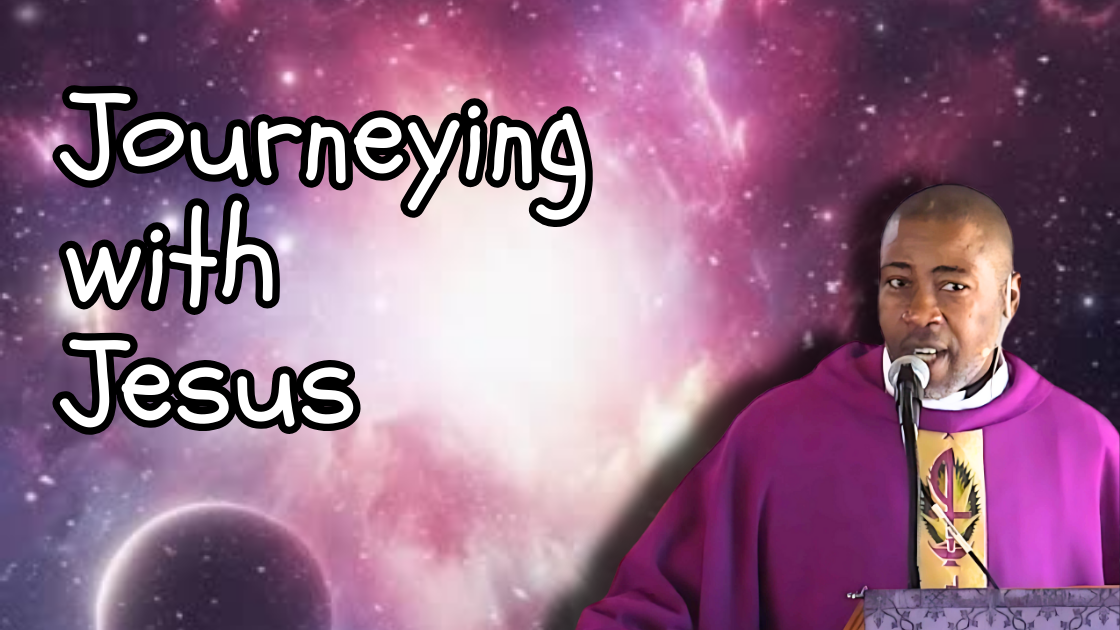 Good morning, everyone. Today, I welcome you to Palm Sunday as we embark on the Holy Week. As we gather, I want to share some words from Luke’s Gospel, chapter 23, verse nine: “Herod questioned Jesus at length, but Jesus gave no answer.” This Palm Sunday marks a significant moment in Jesus’s journey, his final entry into Jerusalem, which was greeted with fanfare and anticipation.
Good morning, everyone. Today, I welcome you to Palm Sunday as we embark on the Holy Week. As we gather, I want to share some words from Luke’s Gospel, chapter 23, verse nine: “Herod questioned Jesus at length, but Jesus gave no answer.” This Palm Sunday marks a significant moment in Jesus’s journey, his final entry into Jerusalem, which was greeted with fanfare and anticipation.
The Contrasting Crowds
Many who followed Jesus believed this would be the moment he overthrew the Roman authorities to liberate God’s people. Others hoped for a miraculous sign proving his Messiahship. But what began with triumphant cries of “Hosanna” quickly turned into shouts of “Crucify him.” Jesus faced a sham trial, His innocence acknowledged by Pilate and Herod, yet succumbed to the crowd’s will. Even then, Jesus took the place of the guilty, exemplifying his sacrifice.
Zooming Out: Understanding the Bigger Picture
Let us take a moment to step back and comprehend the larger narrative at play. In doing so, we gain clarity on what it means to journey with Jesus in his suffering. The incarnation—God taking human form—was for our reconciliation. Jesus, in humble obedience, embraced suffering and death. Paul’s letter to the Philippians beautifully encapsulates this: Jesus was obedient to the point of death, even death on a cross.
The Courage to Endure
We often say, “I’ll do it, even if it kills me,” expressing determination. Yet, rarely do we expect true peril. For Jesus, this was literal. His determination demonstrates true courage—doing what’s right, even at a great cost. Through this, we learn that God’s boundless love pursued our salvation despite suffering.
Silent Witness: Endurance and Persecution
Jesus’s silence in the face of false accusations stands as a profound witness. He did not retaliate but let his life testify to God’s truth. This silence invites us to a deeper faith; it’s not about refraining from words but about trusting God’s justice and embracing his will, even amidst suffering.
The Call to Obedience
This obedience isn’t learned in moments of trial but cultivated throughout our Christian walk. Through Jesus’s teachings, such as in the Sermon on the Mount, we understand the blessing in persevering through persecution. Jesus’s journey from Palm Sunday to Easter reflects meekness, not weakness—a deference to God’s will.
Reflecting on Our Journey
As we reflect, I encourage each of us to examine how our lives mirror the obedience of Jesus. In daily choices, are we willing to take up the cross of obedience, even if it means personal sacrifice? Navigating this world, remaining true to Christ’s teachings is challenging, yet essential.
An Encouragement for Believers
I conclude with encouragement from the letter to the Hebrews, reminding us to consider the endurance of Jesus. In our struggles against sin, the discipline of the Lord teaches us. As children of God, carrying the palm crosses we receive today symbolizes our allegiance and journey with Jesus. Let us mindfully carry this symbol from now until the next season of Lent.
Introduction
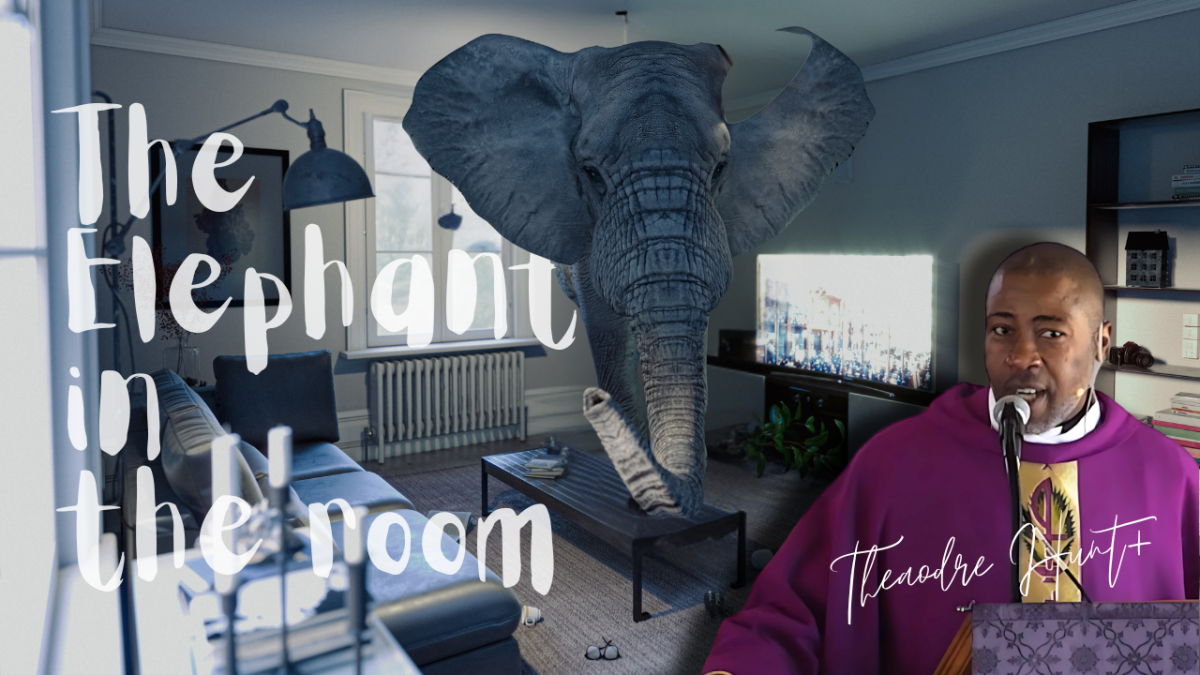 Let us begin with a moment of reflection. It’s good to see you all again this morning as we gather on this fifth Sunday in Lent. Today, we’re diving into a passage from John’s Gospel, chapter 12, where we encounter a profound message hidden within a familiar scene.
Let us begin with a moment of reflection. It’s good to see you all again this morning as we gather on this fifth Sunday in Lent. Today, we’re diving into a passage from John’s Gospel, chapter 12, where we encounter a profound message hidden within a familiar scene.
Understanding the Elephant in the Room
Many of us are familiar with the phrase "the elephant in the room." It’s a metaphorical expression that suggests the presence of a significant, often awkward topic everyone knows about, yet no one addresses. Whether it’s in politics or personal relationships, such elephants often remain unspoken due to discomfort or fear.
In today’s Gospel, John sets the scene in Bethany. Jesus is dining with his friends, including Mary, Martha, and Lazarus—Lazarus, who was raised from the dead, now sitting at the table with Jesus. A scene that might go unnoticed unless we confront the elephant present.
The Significance of Jesus Dining with Lazarus
The unusual scene of Jesus sharing a meal with a man who once was dead serves as our elephant. It’s not just that Lazarus was resurrected; it’s what this act signifies about Jesus’s identity and the divine work of God. It demonstrates that death is not the final word and offers a tangible testament to the renewal and redemption God offers.
The Call to Believe in a New Reality
Jesus’s claim, "I am the resurrection and the life," challenges perceptions of both life and death. It’s a radical invitation to believe in His power, not as a distant future promise but as a present reality. This meal with Lazarus foreshadows the promise that through Him, even death cannot separate us from God’s love.
Mary’s Act of Worship and Recognition
Amidst this profound revelation, Mary acknowledges God’s presence through an extravagant act of worship. Anointing Jesus’s feet with costly perfume, she not only expresses gratitude but also proclaims the magnificent grace of God at work, echoing through the fragrance that filled the house.
Confronting the Elephant in Our Lives
As we navigate our lives, are we willing to confront the elephants, recognize God’s work, and respond like Mary? We mustn’t ignore the divine presence in our midst, lest we be overcome by the very truths we avoid.
Conclusion
In this season of Lent, I urge us to embrace the courage to address the divine elephant, to take up our cross, and follow Jesus. May we be transformed by His presence and may our lives reflect the extravagance of His grace.
Let Us Pray
Creator God, you pave a new path in the wilderness, watering the deserts of our lives. Help us see your hand in all things and open our hearts to be transformed by your renewing grace. May we proclaim your work through our lives, now and forever. Amen.
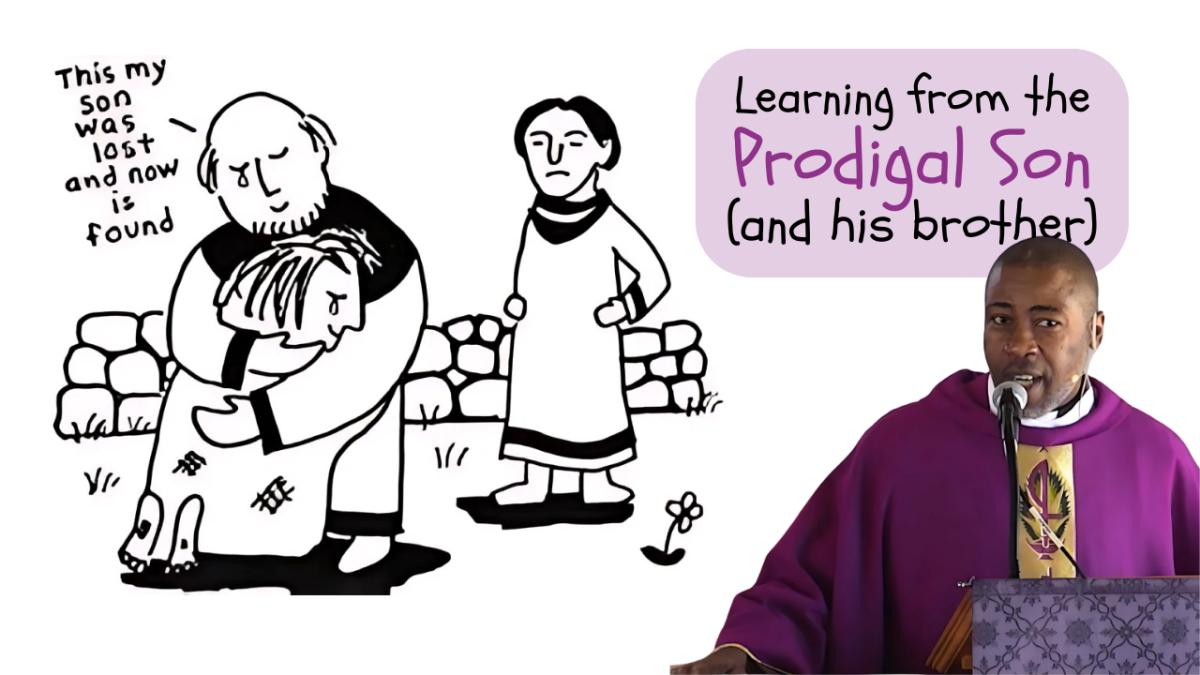 In today’s reflection, we delve deep into the parable of the prodigal son, as told in Luke’s gospel, chapter 15. This story was shared by Jesus in response to the Pharisees and scribes who were upset because Jesus was welcoming and dining with tax collectors and sinners. It serves as a powerful narrative on sin, repentance, and reconciliation.
In today’s reflection, we delve deep into the parable of the prodigal son, as told in Luke’s gospel, chapter 15. This story was shared by Jesus in response to the Pharisees and scribes who were upset because Jesus was welcoming and dining with tax collectors and sinners. It serves as a powerful narrative on sin, repentance, and reconciliation.
The Prodigal Son’s Journey
The parable begins with the younger of two sons demanding his share of the inheritance from his father—requesting what would have naturally come to him only after his father’s death. This act is tantamount to wishing his father dead. He takes his inheritance, ventures into a distant land, and squanders it all on a life without morals or boundaries.
When famine strikes, the son finds himself destitute, longing even for the food that pigs eat—a grievous position for a Jewish man to desire. In this rock-bottom state, he comes to a point of clarity and recognizes his wrongdoing. He decides to return to his father, not as a son, but as a hired hand.
True Repentance and Godly Sorrow
This moment of realization exemplifies true godly sorrow and repentance. The Apostle Paul describes in his second letter to the Corinthians that godly sorrow brings repentance that leads to salvation and leaves no regret, in stark contrast to worldly sorrow, which brings death.
Repentance is more than mere acknowledgment of wrongdoing. It is a heartfelt change in mind and behavior, a turning away from sin towards reconciliation with God and others. This genuine sorrow leads to a restored relationship, removing the burden of guilt and shame.
The Power of Confession and Forgiveness
The psalmist writes of the happiness of those whose transgressions are forgiven, suggesting that silence in acknowledging our sins leaves us burdened. Confession is good for the soul, a tool for reconciliation and wholeness, allowing us to admit our faults and ask for forgiveness.
Refusing to acknowledge wrongs and offer genuine apologies can lead to discord, as seen in historical and current events where nations refuse to recognize their past misdeeds.
Reconciliation: At the Heart of Our Faith
Ultimately, reconciliation is central to the Christian faith. As followers of Christ, we are called to convey the gospel message that we can freely confess our sins and be reconciled to God, who does not hold our transgressions against us.
In the spirit of the prodigal son, we are invited to repent truly and to rise from our rock-bottom places, turning towards a fresh start with God and one another.
Amen.
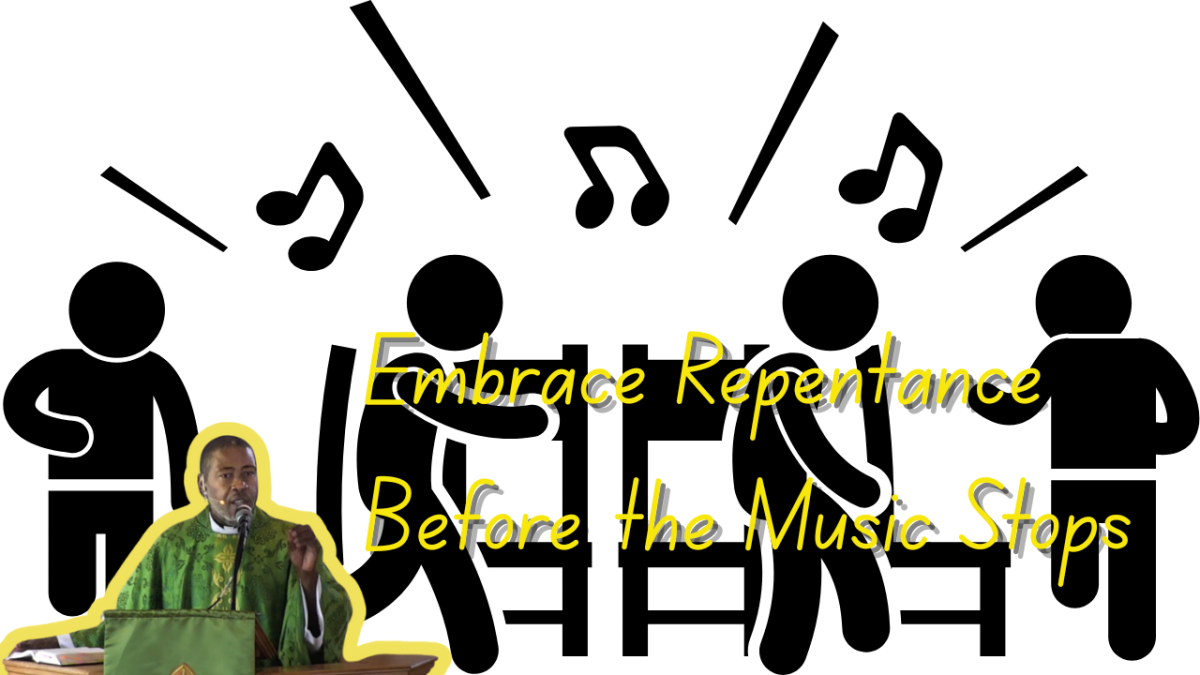 In Luke’s Gospel, chapter 13 verse three, Jesus imparts a sobering reminder: “Unless you repent, you will all perish as they did.” This notion of repentance can seem daunting, yet it is a central tenet of our spiritual journey. Similar to the game of musical chairs, life is unpredictable. We must be ready when the music stops. Here, I’ll share reflections on embracing repentance before it’s too late.
In Luke’s Gospel, chapter 13 verse three, Jesus imparts a sobering reminder: “Unless you repent, you will all perish as they did.” This notion of repentance can seem daunting, yet it is a central tenet of our spiritual journey. Similar to the game of musical chairs, life is unpredictable. We must be ready when the music stops. Here, I’ll share reflections on embracing repentance before it’s too late.
A Lesson from Musical Chairs
Growing up, I often played musical chairs at birthday parties. The lively music and simple rules made for an exciting game. But the key was always to find a chair the moment the music stopped. This game is a poignant metaphor for life—no one knows when the music will stop, leaving us scrambling for security.
The Gospel of Repentance
In our Gospel passage, we see people approaching Jesus with news of an atrocity: Galileans were massacred while worshiping. Jesus challenges the misconception that tragedy befalls only the wicked by asking if they thought those Galileans were worse sinners. Contrary to popular belief, our safety isn’t guaranteed by our perceived righteousness.
Repentance: A Continuous Journey
Jesus emphasizes the need for true repentance: an authentic turning away from distractions and a reorientation towards Christ. This act is not a singular event, but a continual practice along our Christian journey. Every misstep presents another call to repentance.
The Grace of Lent
Lent offers us a unique opportunity to pause and reflect upon our lives. It’s a time for introspection, allowing us to realign ourselves with Christ’s calling. This season gives us the chance to correct our course and deepen our connection with God.
Honesty and Humility in Repentance
Repentance demands honesty, humility, and the courage to change. It’s necessary to admit our mistakes and step onto God’s path of grace. Paul reminds us that even when we believe we stand firm, we must remain vigilant and humble, relying on God’s strength, not ours, to avoid stumbling.
A Final Parable
Jesus’ parable of the fig tree serves as a reminder of divine patience and opportunity for growth. Despite its unfruitfulness, the fig tree is given another chance to flourish. Likewise, God graciously offers us time to bear fruit in His vineyard.
Conclusion
We live within the rich soil of God’s grace, surrounded by His love and forgiveness. My prayer for this Lenten season, and beyond, is that we seize the opportunity for repentance and growth, ensuring that we are rooted firmly in Christ before our time is unexpectedly up.
In the words of the prayer: “God of infinite goodness, renew our call to repentance and aid us in our journey, surrounding us with grace to fashion our lives anew through Jesus Christ our savior. Amen.”
Now, regarding the meeting minutes in HTML format, unfortunately, Descript does not support HTML formatting or content creation. You can find more help with formatting at Descript’s help center. If you need assistance with anything else, let me know!
Introduction
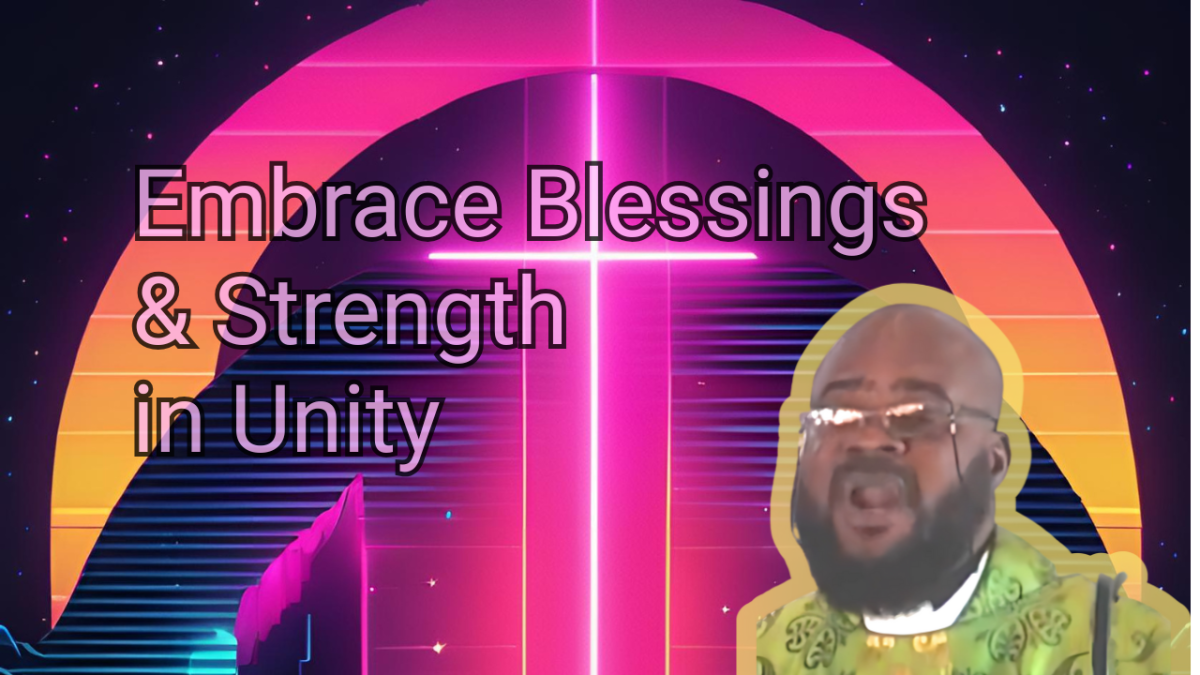 Today, during our nine o’clock service, we gathered in a serene and inspiring environment, blessed by God. Each morning we are offered blessings, and with an open heart, these blessings are waiting for every one of us. As we reflect on these gifts, let us also delve into the teachings of Father Abraham and the power of unity in faith.
Today, during our nine o’clock service, we gathered in a serene and inspiring environment, blessed by God. Each morning we are offered blessings, and with an open heart, these blessings are waiting for every one of us. As we reflect on these gifts, let us also delve into the teachings of Father Abraham and the power of unity in faith.
Our Call to Worship
In harmony with our blue hymn book, Page 430, we celebrate the blessings bestowed upon us. As we continue our morning reflections, remember that God provided us with beautiful weather and gentle rain as tokens of His blessings.
Both physically and spiritually, our blessings are present, ready to be embraced. To receive blessings from the Lord, we must gather among His people, as the Bible assures us: “Where two or three are gathered in My name, there I am.”
Do Not Lose Heart
Turn to your neighbor and softly tell them, “Do not lose heart.” None of us are as old as our patriarch, Father Abraham, yet, he did not lose heart. In Genesis chapter 15, during his prayers, the Lord spoke to him in a vision, promising Abraham that his name and destiny would change.
Faith Through Endurance
Reflect on Abraham’s endurance. He was steadfast even amidst trials, a virtue needed for receiving God’s blessings. As an African man married in 2010, I’ve been waiting on the Lord, just as Abraham did, despite the pressures of age and family. Remember, “Your blessings are on the way. Do not lose heart. Your healing, restoration, miracle, breakthrough, and success are here.”
Emphasizing Togetherness in Faith
The world advances, and so must our worship. While tradition binds us, today’s spiritual journey is enlivened by dynamic prayer and community support, much like Paul and Silas in their imprisonment. Gone are the days of passive participation; active engagement in prayer and praise fuels spiritual growth and joy.
Support in the Community
As we navigate life, remember our need for mutual support. Alone, we may succumb to doubt and despair. Together, our spirits are uplifted. In Proverbs chapter 15, we learn the value of counsel. A problem shared is a problem eased.
Bring your prayer requests to the altar, trusting God and the coalition of believers. It is an act of faith, supported by God’s promise that where two or three gather, He is present.
Concluding Encouragement
In challenging times, let us encourage one another. Pray for absent sisters and brothers, for together, we reinforce each other’s faith. As Ecclesiastes reminds us, two are better than one; when one falls, the other lifts them up.
This is a call to keep the heart open to God, to embrace joy and compassion, and to support fellow believers in prayer. As we seek God’s guidance and blessings, remember the power of community and the strength found in unity.
Let’s continue to seek these blessings and live in faith as a unified congregation, uplifting individual spirits and enriching our collective journey in Christ. Hallelujah!
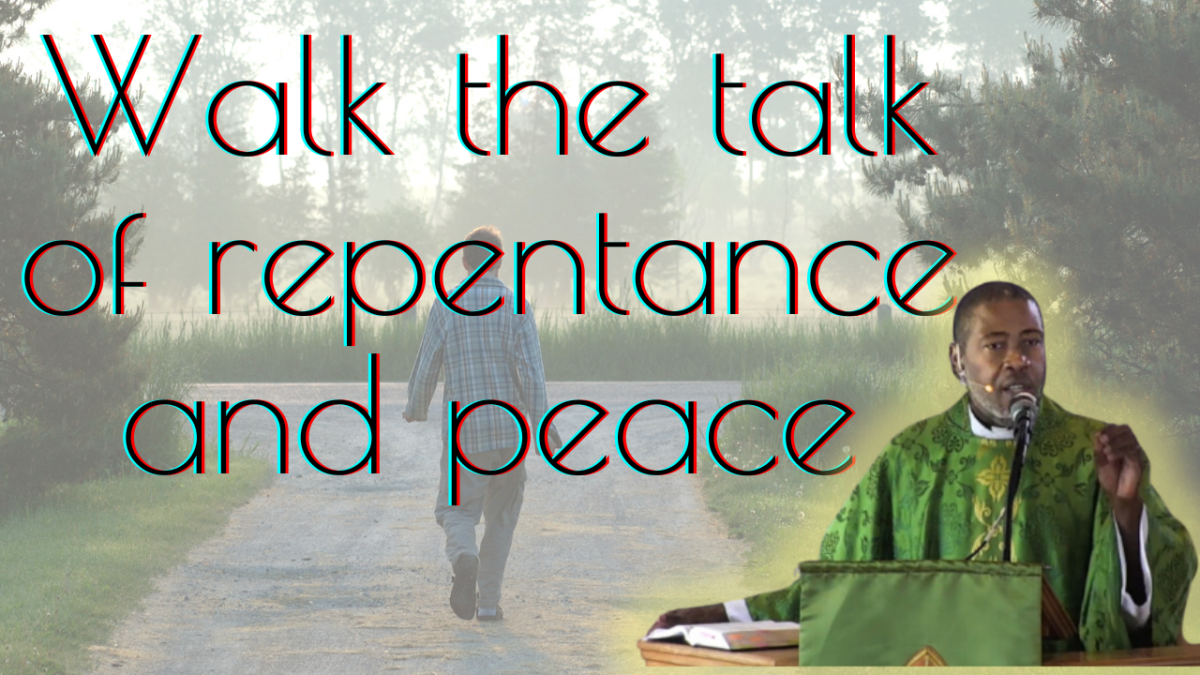 Luke tells us that John went into all the region around the Jordan, proclaiming a baptism of repentance for the forgiveness of sin. As it is written in the book of the words of the prophet Isaiah, the voice of one crying out in the wilderness, prepare the way of the Lord, make his paths straight.
Luke tells us that John went into all the region around the Jordan, proclaiming a baptism of repentance for the forgiveness of sin. As it is written in the book of the words of the prophet Isaiah, the voice of one crying out in the wilderness, prepare the way of the Lord, make his paths straight.
Over the last year and about two months, the world’s attention has been captivated by what are perhaps the two major conflicts of the world. The war between Russia and Ukraine, and the war between the Israeli government and Hamas. The reality is that neither of these wars started in this generation. Their roots, originating from that original offense, go back for many generations. Some nations and people have been fighting for so long that they probably can’t even remember what they were really fighting for anymore. We just know that we are at war.
It takes real effort to remember an offense over many generations because it requires intentionality in holding a grudge. It requires intentionality to hand on unforgiveness, to teach those coming after us what those who have gone before us have done, in a way that engenders a desire for vengeance, even against their descendants. You didn’t do me anything, but your father’s father’s father’s father’s father did, and so you’re going to bear the brunt.
Transforming Our Path
Where does it all end? How do we stop this moving train? Or at least, how do we change its course or direction? While it may be easy for us to ask such questions about external wars, it is much more challenging for us as the people of God to address the questions of such wars which rage within us. That is the internal struggle over whether we strive to walk more and more in the light of Christ and in communion and fellowship with his body, the church, or whether we continue to try to do things our own way, on our own terms in this life, and to try to go it alone. Because that’s the war that rages within each and every one of us.
The Challenge of Identity
It is both ironic and devastatingly sad that many nations and peoples continue to fight, even to this day, against other nations. They’ve invested so much in the cause—so much into this conflict—that stopping feels impossible. The conflict has become such an integral part of their identity that they would find it very difficult to even recognize themselves if they just stopped fighting. This is who we are. Similarly, I would venture to say that we find it extremely difficult to change the course of our lives because we feel that we have gone so far down a particular road.
Our lives and our identity have been shaped by the unfortunate choices and decisions that we have made along the way, forming a kind of home for ourselves. Leaving that home or recognizing who we really are if we were to live more like the way Christ calls us is a difficult task. But yet, friends, that is precisely what repentance calls us to do.
The Call to Repent
In repentance, there is a change of heart, a change of mind with regard to the choices that we have made or the things that we have done, and therefore a change in the direction in which our life is headed. That’s what repentance means. There is authentic godly sorrow over our past deeds because in that moment of repentance, we recognize and acknowledge that God’s way was always right and that it is we who have strayed. From that moment of repentance, we endeavor in the grace of God and with the power of the Holy Spirit to continue along God’s way and not our own.
The Pathway to Peace
Repentance is stopping right in our tracks—and turning back towards the light, turning back towards God. Walking towards the light that is Christ’s life, it is in this act of repentance, stopping, acknowledging, turning, and walking towards God that we begin to experience the peace that Christ brings. God’s peace goes to the root of our conflict. It goes to the heart of our sin. It begins with truth-telling, and this truth-telling must often work through conflict to establish a true and authentic peace.
Conclusion
Perhaps the place to begin in identifying those things of which we need to repent is by giving careful attention to those areas of our lives where we do not presently experience God’s peace. As you consider who you are and where you are in the light, where is that groaning in your life? Where is that heaviness? Where’s that sense of unease? Where’s that sense maybe of complacency in the midst of the darkness?
God never called us to be peacekeepers. God calls us to be peacemakers. And making peace is by no means easy work, but it is important work. It is gospel work. It is the path of peace. It is our salvation.
 It was a special time together this past Sunday, especially as we commemorated Mother’s Day. A very happy Mother’s Day indeed to all mothers and those who have served as mother figures in the lives of others. You are most welcome.
It was a special time together this past Sunday, especially as we commemorated Mother’s Day. A very happy Mother’s Day indeed to all mothers and those who have served as mother figures in the lives of others. You are most welcome.








